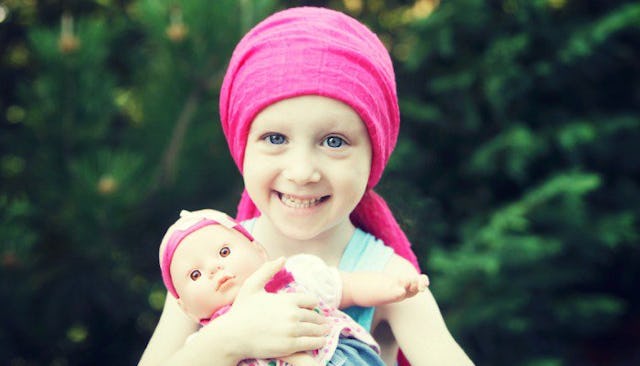7 Ways To Support A Parent Whose Child Has Cancer

When my 9-year old daughter was diagnosed with leukemia, I was humbled by an outpouring of support. My husband’s family and my own came to visit. Friends cared for my other children. Acquaintances offered help. I appreciated everything and everyone. Many people weren’t sure what to say, however, so with the hope of helping others to effectively communicate about childhood cancer, I offer the following common statements along with my reactions as insight into a mother’s mind:
1. ‘How is your child/your family doing?’
Thank you for acknowledging my daughter and the intenseness of the situation, and I especially appreciate when people include all of my children. This open question allows me to divulge what I feel comfortable saying at the moment. And it changes by the moment, so this is the perfect lead-in to a conversation. The only time it backfires is when the questioner can’t handle the response and back-peddles out of the room. For these people, I’d rather you just say, “I’m thinking about you,” which allows me to recognize your concern but not make you uncomfortable with details.
2. ‘Your child is in my thoughts/prayers.‘
Again, thank you. This means so much to know you’re thinking about my child. To know that there are people on this Earth who care whether or not my child is alive—who want her to live—is incredibly powerful. There have been times when I’ve been down, and I think about the people who are rooting for us, and it helps to push me forward. Several families mention that they pray for my daughter daily, and one friend texted me that she and her family are our “prayer warriors.” It made my heart swell.
3. ‘Can I help you?’
This one’s great, but I feel incredibly awkward voicing my needs. Those people who just make dinners and bring them over, offer to take my other kids on outings, and bring me chocolate and tea, that’s even better. One time my husband and I came home from the hospital, and our neighbors were shoveling our driveway. Another time, we came home to find a friend working on a shed that we were building. Gas cards, grocery cards, and gift cards arrived in our mailbox. Several people organized fundraisers, and we loved to be involved with them. All of these things were wonderful. For me, the best thing was help cleaning my house. When my daughter’s counts were low, the only thing I felt I could do to help her was to get rid of as many germs as possible—a limited form of control. Having those people who continue to help now that the initial shock has worn off is invaluable. For us, this is a multi-year battle, and the stress builds over time.
4. ‘I know someone else who has/had cancer!’
Both my husband and I had conversations with people where they would try to connect with us and share a similar experience. They went something like this: “My uncle had leukemia. It was awful. He struggled for five years and then died.” Let me be clear—this is not helpful. On the other hand, I appreciate stories about kids who beat childhood cancer and are grown and doing great 30 years later.
5. ‘She’ll get through this. I just know it.’
Nobody knows what will happen. This person is telling me what they think I want to hear and I appreciate their concern, but ultimately this statement is not helpful. Comments like these feel patronizing and heighten my knowledge that the future is uncertain. I am hopeful my daughter will do well with few side effects, but right now I am taking things one day at a time—really more like five minutes at a time.
6. ‘I don’t know if I could do what you’re doing.’
It’s not like my daughter or I signed up for this. What is the alternative—to let her go it alone? If you were in my situation, you would also make sure your child shows up for treatment and takes her medicines, and you would hold her when she cries. You would respond to those who try to connect with you with as much finesse and timeliness as you could muster. I am angry, afraid, frustrated and hopeful. I am not doing great; I am doing what I have to do. And so would you.
7. ‘Would you like to go for a walk?’
This is such a lovely question. As long as someone is home to watch my daughter, my answer to this question is almost always yes. Walking with friends curbs my anxiety, releases toxins, and gets me away from the all-encompassing grip of cancer for a bit. It allows me to talk freely, but also to find out what other people are doing. While cancer does rule my life right now, I still want to be able to support those whom I love. I appreciate when people share what’s going on in their lives as well.
Acknowledging my daughter’s struggle and facing it head on is how I roll. While every family is unique, I bet that every parent would agree that having support from others provides strength. Showing that you care, either in actions or words, is a powerful way to help a family with cancer.
For additional ways to help families cope with childhood cancer, check out these sites:
If you’d like to read about how a robot allowed my daughter to attend school while she was in the throes of cancer treatment, click here.
This article was originally published on